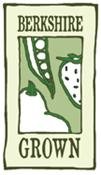
This photo sent by Jesse Robertson-DuBois of Holiday Farm in Dalton, MA features pigs eating grass -- an alternative to hog factories.
The Union of Concerned Scientists explore and demonstrate:
How grass-fed beef and milk contribute to healthy eating
Americans love their beef and milk. With about 70 percent of the population consuming one or the other several times a week, the United States is the largest beef producer and one of the largest dairy producers in the world. But this love affair has serious consequences for the health of consumers, the environment, and the cattle themselves.
Many people assume that beef and dairy cows spend most of their lives happily grazing in grassy meadows. The reality is that most cattle in the United States spend significant parts of their lives in crowded feedlots with hundreds or thousands of other animals, eating feed that contains large amounts of grain (primarily corn). While cattle on pasture rarely get sick, those confined to feedlots and fed grain are prone to disease and most feedlot operators routinely feed antibiotics to prevent illness and to accelerate growth. This, in turn, increases the risk of antibiotic resistance in humans. In addition, air and water pollution stemming from dust and mountains of feedlot manure, and the many fertilizers and pesticides used in grain production, exact a heavy toll on the environment and the health of farmers, farm workers, and nearby residents.
Fortunately, there are better ways to raise food animals. Raising cattle on pasture lessens environmental damage, improves animal health, and reduces antibiotic use. Over the past decade, numerous scientific studies have shown that the meat and milk from pasture-raised animals are higher in fats that may confer health benefits on humans. To confirm how strong the findings are, UCS undertook the first comprehensive comparison of fat levels in beef and dairy products from conventionally raised and pasture-raised animals. Our report, Greener Pastures: How Grass-fed Beef and Milk Contribute to Healthy Eating, presents the results of this analysis and examines what health benefits food producers could promote on their product labels.
READ MORE ON the Union of Concerned Scientists website: copy and paste this:
http://www.ucsusa.org/food_and_environment/sustainable_food/greener-pastures-faqs.html






